- Home
- Anna Schmidt
Last Chance Cowboys Page 2
Last Chance Cowboys Read online
Page 2
After being assured that at least a couple of the cowboys who had worked for the Johnsons would stay on to help, she and Calvin had awoken one morning to find the bunkhouse in flames and no sign of the men who had once lived there. That was the first indication that life was not going to be easy. But Calvin had reminded her that there were other sheep ranches in the area, including one owned by her half brother, Henry Galway. Calvin had promised her that, in time, folks would come around.
He was wrong.
Three weeks after the fire in the bunkhouse, Calvin had been out with the sheep and she’d been hanging laundry when a band of masked men had galloped into the yard, whooping like savages. They had torn down her wash lines, trampled the clothes, and circled her with their horses, brandishing their guns and firing into the air. Her son, Joshua, had stumbled from the house, his thin body dodging the hooves of the horses as he made his way to her. She had reached for him and folded him in the safety of her embrace, bowing her head and praying that the men would leave. They had finally ridden away, after what seemed an eternity, but not before shooting out the windows of the house. And they’d shouted a warning—either she persuade her husband to leave, or they would return.
Even if she’d intended to follow their orders, she had no chance. After her husband and the two shepherds were found brutally murdered, the soldiers had completed the drive to bring the sheep back to the lower grazing land. Because the winter had been so cold and harsh, there had been no further incidents.
Following Calvin’s funeral, Henry had told her he would manage both places until she could decide what she wanted to do. He was ten years older than Nell, the child of their mother’s first marriage. They were not close, but there was no other family she could rely upon.
In the meantime, Calvin’s family had gone back to Nebraska—all except his cousin, Ernest. It was Henry who had persuaded Ernest to stay. At first, Nell had been relieved. Allowing the two men to assume responsibility left her free to attend to Joshua and the house. Sheep ranchers were still something of a rarity in this part of Arizona, and those that had settled there were widely scattered—circumstances that left Nell with few women beyond Henry’s wife, Lottie, to rely on for support. When Henry and Ernest were away tending the combined flocks from the two ranches, often for weeks at a time, Henry insisted that Lottie and at least one of their twins, Ira and Spud, stay with Nell to be sure she and Joshua were safe.
In spite of everything, Nell had made one friend whom she trusted to listen and offer advice. The local doctor, Addie Porterfield, called on her a couple of times each month. She came to examine Joshua and told stories of her husband’s younger brother, who had also been ill as a boy. “Now he is a big, strong, healthy man, and one day, you will be as well,” the doctor assured Joshua.
But on the nights when the menfolk were away, Ira or Spud slipping off to town instead of sticking around on watch, Nell sat alone and held Joshua as he coughed and gagged. She wondered what the future might hold for them. Was she doing her best by staying? Would Joshua be better off if they moved back to Nebraska, closer to Calvin’s family? Her own family was scattered—her parents had died just before she and Calvin had headed West, and her siblings had hardships of their own. She had been discussing her options with Lottie when her sister-in-law had suggested perhaps it was time she consider a union with Ernest.
“It’s not yet six months since Cal died,” Nell had protested.
“Henry says you need to think past normal grieving.” Lottie had bitten off a thread on the shirt she was mending for her husband. “Henry says, come spring, with the lambing and all, we’ll have all we can do just managing our place, and you’re gonna need someone to take over here. Ernest is a good man and a hard worker. You could do worse.”
Nell had tried to convince herself that Lottie had a point, but the truth was that she barely knew her husband’s cousin. Ernest was nothing like Calvin, and it bothered her the way he had taken her late husband’s place at the table right away without asking her. He had taken liberties from the day he arrived, in fact—smoking Calvin’s tobacco, going through the papers in Calvin’s desk with Henry, even wearing Calvin’s yellow slicker when the weather turned cold and wet.
But none of that compared to the liberty Ernest had taken one bitterly cold winter night. Henry, Lottie, and the boys had gone back to their own ranch, leaving Ernest to keep watch. Someone had made an attempt to rimrock or stampede Henry’s flock over a cliff. Her brother had insisted that Ernest set up his bedroll downstairs in the kitchen and spend the night inside the house. “If there’s a gang out looking for trouble, they’ll not miss the opportunity to strike here if they think it’s a woman alone.”
Nell had agreed, recalling how frightened she had been when those men had attacked in broad daylight. But sometime during the night after she had finally gotten Joshua settled, she had heard the soft click of her bedroom door, a door she always left open so she would not miss Joshua calling out for her. Before she could come awake enough to react, Ernest had crawled into her bed. Without saying a word, he had pressed himself against her, and beneath the covers, he had run his hand up and under her nightgown. Tears had filled her eyes as she stiffened against his touch.
Blessedly, Joshua had started to choke, his racking coughs penetrating the closed door. Somehow, she had found the strength to push Ernest away and run to tend her child. Once she had gotten Joshua settled again and returned, she had found Ernest sound asleep and snoring in her bed. She had spent the remainder of the night sitting in the corner of the room in the rocking chair her husband had built for her. On her lap was Calvin’s loaded shotgun.
Just before dawn when Ernest began to stir, she had walked to the side of the bed and placed the barrel of the gun just even with his nose. “If you ever try something like that again,” she had said in a low, husky whisper to keep Joshua from possibly overhearing, “I will blow your brains out. Are we clear?”
He had pushed the barrel of the gun aside and stood. “You might want to check with your brother on that, you ungrateful bitch,” he had muttered. He had picked up his clothes and walked downstairs. Still carrying the shotgun, she had followed him and seen him go out to the porch, break the ice that had formed on the wash basin, and then splash water on his face. She had set the gun within reach while she stirred the embers of the fire in the cook stove. Moments later, Ernest had returned, snapping his suspenders over his shoulders. He had poured himself a cup of coffee and taken Calvin’s place at the table as if nothing had happened.
For weeks, she’d kept the incident to herself even as she served up meals for whoever was in residence with her. In the evenings, after she’d put Joshua to bed, she sat darning socks while whichever nephew was there for the night flipped playing cards into a hat. On the day before the men were to drive the flock to a ranch fifty miles away for a communal shearing and lambing, Lottie had fallen ill. Ira would stay with his mother, Henry had told Nell, but he needed at least one son to come with him. Therefore, Ernest would stay behind to make sure she and Joshua were safe.
“No. Take Ernest with you and let Spud stay here, or I’ll stay alone,” she had said. It was an order rather than a request.
“Not a chance. Leave you and your boy here on your own?”
“The soldiers will come by, and Doc Porterfield, and—”
“Ernest stays.”
She had seen no choice but to tell him what had happened. Fighting back tears at the memory of Ernest putting his hands on her and pressing himself against her, she had given her half brother the details. But instead of being outraged as she had expected, he had sighed heavily and said, “Calm down. If you’re so all fired determined to make more of this than it warrants, he’ll come with me. Maybe a few weeks on your own will bring you to your senses—if the cattlemen don’t get to you first.”
“He was in my bed, Henry.”
“We’ll sort this out af
ter him and me get back. But, Nell, you need to come around to seeing Ernest as your best hope if you’re determined to stay on here. He may have gotten ahead of things, but a man has needs.”
She had stared up at him openmouthed with shock while he had instructed his sons to stay behind—Ira with Lottie and Spud with Nell—then climbed aboard the wagon and shouted for Ernest to grab his gear. “Change of plans,” he said before turning his attention back to her. “Do not fight me on this, Nell. You need a man to run things around here, and Ernest wants the job.”
Now, a few days later, Nell saw a single rider in the distance. Having sent Spud off with a basket of food she’d made for Lottie and Ira, she was alone in the yard with Joshua, and for the first time since pleading with Henry to take Ernest with him, she felt a shiver of fear.
“Go in the house, Son,” she said softly.
“Should I bring you Pa’s gun?” Joshua asked.
“No. Just go inside.”
Joshua did not argue.
Nell continued the repair work she’d begun on the chicken coop the raiders had destroyed.
As the man came closer, she saw that he was tall—taller than Calvin had been. He wore brown trousers, a faded blue shirt, a tan suede vest, and a battered Stetson that looked as if it had seen its fair share of bad weather and hard use. She thought of the hat she had saved up to buy for Calvin last Christmas, the hat she had placed on account at Miss McNew’s dry goods store in Whitman Falls, paying it off a little each time she went into town. The hat she had never gone back to pay off and collect. There seemed little reason to do so now.
She tightened her grip on the ax she was using to hammer the chicken wire into place, her mind racing. She needed to come up with a plan for protecting herself and Joshua should the man not be alone. She glanced around, searching for any sign of other riders who might plan to come at her from all directions.
This was a cowboy—that much was evident. He rode a large stallion, and there was a coil of rope fastened to the horn of his saddle and a holstered gun strapped onto his waist. The man was taking his time, and that frightened her more than if he had come riding into the yard at a full gallop.
“Can I help you, mister?” she shouted, shielding her eyes with one hand even as she kept a tight hold on the short-handled ax with the other.
He reined his horse to a stop and dismounted. To her surprise, he removed his hat as he approached her. “Mrs. Stokes?”
She planted her feet and faced him. “Who’s asking?”
His lips quirked into the beginning of a smile, but he squelched that by squinting into the sun behind her. “Name’s Trey Porterfield. My sister-in-law Addie’s the doctor in Whitman Falls.”
This was the man Addie had told Joshua about? This tall, robust cowboy who looked like he’d never been sick a day in his life?
“Doc Addie has been good to us,” she said. “Did she send you?”
He rolled his hat in his hands. “Not exactly. She has talked a good deal about your boy. Seems to think we might have something in common. I was pretty sickly as a kid myself.”
“So we’ve heard.” She waited.
“Then there’s the fact that my pa died when I wasn’t much older than your son.”
“Joshua’s father was murdered,” she replied in a low growl that did nothing to disguise her rage.
“So was mine,” he said softly.
She realized he was focusing all his attention on her.
“I’m sorry for your loss,” she said and glanced toward the coop. “I’ve got work to do here, Mr. Porterfield. Thank you for stopping by. It was kind of you.”
“How ’bout I finish that coop for you?” He waited a beat, then grinned. “I don’t charge much—just a tall glass of water. That sun’s already hot enough for it to be July, and here it is not even May.”
Nell wrestled with the urge that came over her to return his smile, to lower her guard after months of always expecting the worst. But she had been through enough to know trusting a cattleman—trusting any man—was a dangerous business. “You can fill your canteen in the stream over there before you head back,” she said. “I can manage the coop.”
From the corner of her eye, she saw Joshua had eased out onto the front stoop and was watching the exchange.
“That your boy there?” Instead of being insulted at the rejection and stalking off as she had expected, Trey Porterfield remained standing a few feet from her. He even raised his hand in greeting to Joshua.
A lump of fear hardened in her throat, and for the first time ever, she wished that Henry or one of his sons—or even Ernest—was around. “What is it you want, mister?” The words came out in a whisper. She could make no sense of his presence and therefore could only think that his taking notice of Joshua was somehow a threat.
Something in her expression must have revealed her distress, because he took a step back, holding up his hands as if to calm her, then he put on his hat and mounted his horse. “I mean you and your son no harm, Mrs. Stokes. Addie has… I was in the area and…”
“Thank you for coming by,” she managed as she forced herself to turn away and give the appearance of working to repair the coop again. But in reality, she gripped the ax handle and listened for his horse to retreat. If he rode toward her or the house, she would sling the ax at the horse. She imagined the horse injured and perhaps rolling over the rider, giving her time to make it to the house and Joshua—and Calvin’s shotgun.
When she heard the horse walk away, then break into a trot that faded with the distance between them, she let out a breath and with it some of the knot of fear that had threatened to paralyze her. Her eyes filled with tears, and for the thousandth time since Calvin’s death, she wondered what kind of future lay ahead for her and Joshua. Was she being foolhardy by insisting they stay and carry on Calvin’s dream? The ax fell from her trembling fingers, and she knew that her thought of throwing it at the horse had been nothing more than the fantasy of a desperate woman.
* * *
After leaving the Stokes place, Trey stopped at the top of a ridge overlooking that property. He sat for a moment, staring down at the sheep farm. He knew this place almost as well as his own ranch. The Johnsons and the Porterfields had been close—his sisters and Louisa Johnson had been the best of friends, and he had once sat at the big cypress table in that house sharing many a meal with his father and older brother and George Johnson while the men talked business.
Below him now, he could see the Stokes woman working to complete the repair of the coop. He dismounted, pulled out the sketchbook and pencil box he carried everywhere he went and hadn’t found the time to open in months. He’d picked up the habit as a boy, a way to help him think through any situation. Through the years, his art had continued to be a refuge for him, a place he retreated to when he needed to work out the challenges that came with being in charge of the largest spread in the region.
With a few quick strokes, he drew the outline of the house, the outbuildings, and the fenced pastures that surrounded the property—all subjects he had drawn many times in the past. He added the boy standing just outside the door of the house, and he drew the woman with her sunbonnet hanging down her back. The bonnet was of little use to her if she didn’t wear it properly. He recalled the way she had squinted up at him and shielded her eyes with one hand, even as she clung to the ax with the other.
He did not sketch the ax.
Nell Stokes had surprised him. He’d paid her little attention the few times he’d seen the family in church, more interested in her husband and how they might be able to relieve the tension between cow men and herders. Now he realized that she was young—younger than his twenty-seven years, to be sure. She was slender, almost fragile-looking. And yet he recalled the way she had walked alongside her husband as they left church services, and just now, when she had faced him, he had seen such strength in her. He�
�d also seen something else. Fear of him. It was the fear that had made him back away and leave.
He had hesitated before approaching the house when he saw a husky older boy walk away with a picnic basket tied to his burro’s saddle. It had occurred to him that it might be best to return when her brother was there to advise her. But he hadn’t been able to resist getting a closer look at a woman who had decided to stay in spite of her horrific loss and the hardships she must have known lay ahead.
If he were to be completely honest with himself, the single thing that had kept him from even hinting at the idea of buying her out was the fact that business was the last thing on his mind once he saw her. No, what he felt on meeting her was an attraction so unexpected and intense that the feeling had taken hold of him and muddled his thinking.
He turned the page of his sketchbook and began a more detailed drawing of Nell Stokes, beginning with her oval-shaped face. With quick, sure strokes, he added eyes—large and filled with questions, thin lines radiating from the corners hinting at a time when she had laughed freely and often. He moved on to her cheeks and the sprinkling of freckles that danced across them and the bridge of her nose. As he prepared to sketch her mouth, he hesitated. He closed his eyes to recapture the details—her lower lip full and a little chapped from the dry heat. Her upper lip a perfect bow. Her teeth when she spoke surprisingly straight and even.
Trey worked quickly, his mind a blur of detail as it always was when he sketched. Art and reading were the two activities he had used as a child to fight off the boredom that came with spending weeks in bed. He’d challenged himself to remember tiny details, minor facts. At the moment, it was the details of the widow Stokes’s lovely face that found their way onto the page.

 Renegade
Renegade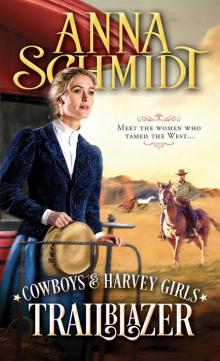 Trailblazer
Trailblazer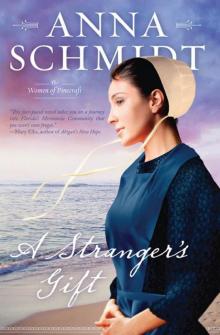 A Stranger's Gift (Women of Pinecraft)
A Stranger's Gift (Women of Pinecraft)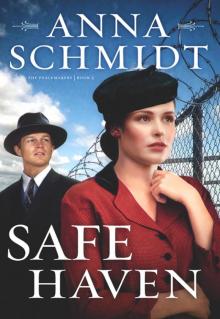 Safe Haven
Safe Haven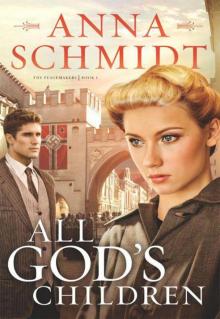 All God's Children
All God's Children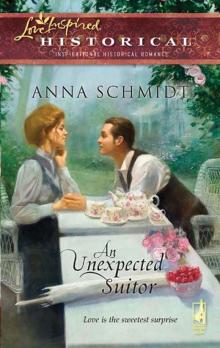 An Unexpected Suitor
An Unexpected Suitor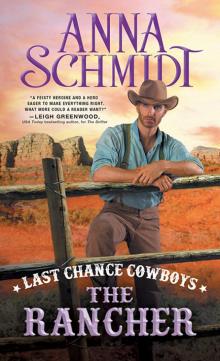 Last Chance Cowboys
Last Chance Cowboys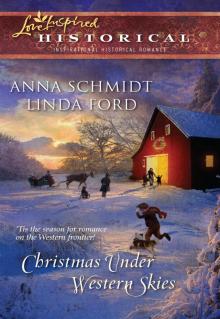 Christmas Under Western Skies
Christmas Under Western Skies Love Finds You in the City at Christmas
Love Finds You in the City at Christmas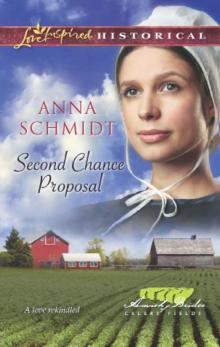 Second Chance Proposal
Second Chance Proposal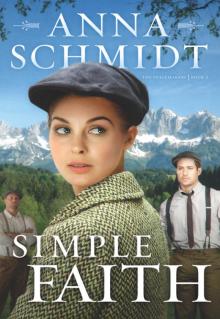 Simple Faith
Simple Faith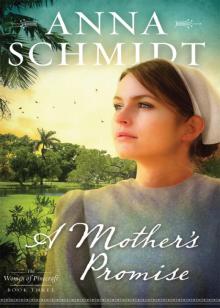 Mother's Promise
Mother's Promise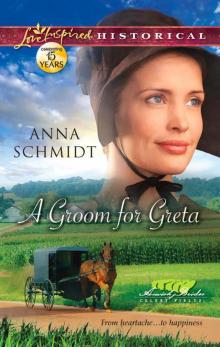 A Groom for Greta (Amish Brides of Celery Fields)
A Groom for Greta (Amish Brides of Celery Fields)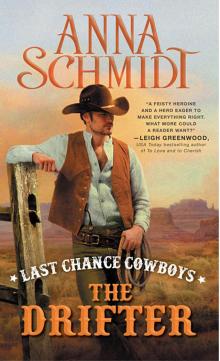 Last Chance Cowboys: The Drifter
Last Chance Cowboys: The Drifter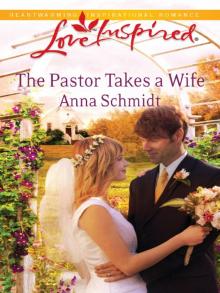 The Pastor Takes a Wife
The Pastor Takes a Wife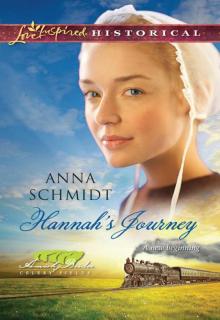 Hannah's Journey
Hannah's Journey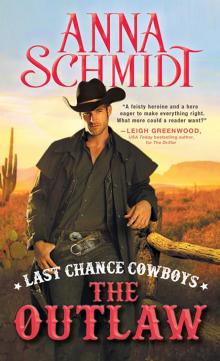 Last Chance Cowboys: The Outlaw
Last Chance Cowboys: The Outlaw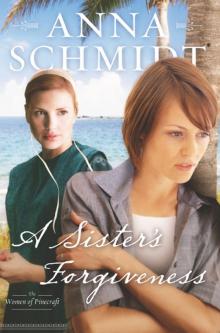 Sister's Forgiveness
Sister's Forgiveness